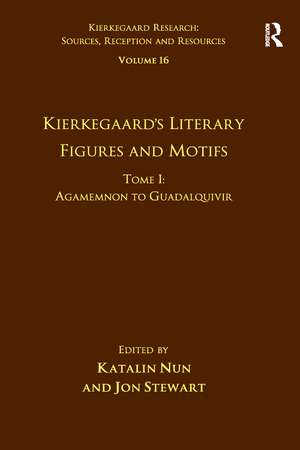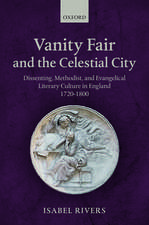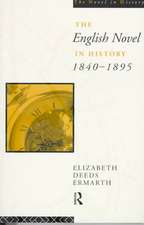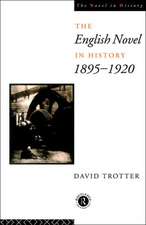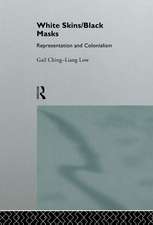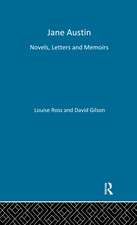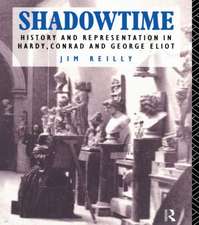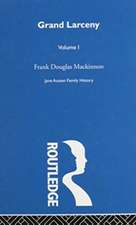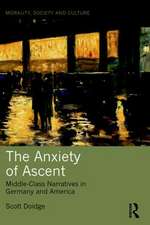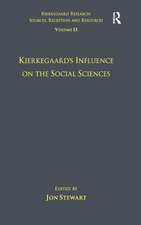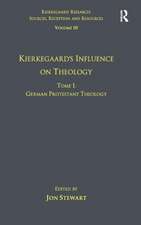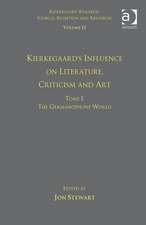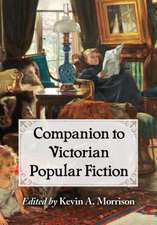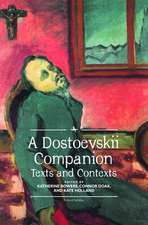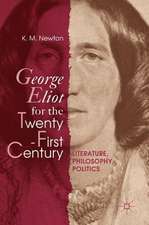Volume 16, Tome I: Kierkegaard's Literary Figures and Motifs: Agamemnon to Guadalquivir: Kierkegaard Research: Sources, Reception and Resources
Autor Katalin Nun, Jon Stewarten Limba Engleză Paperback – 30 iun 2021
| Toate formatele și edițiile | Preț | Express |
|---|---|---|
| Paperback (1) | 390.41 lei 6-8 săpt. | |
| Taylor & Francis – 30 iun 2021 | 390.41 lei 6-8 săpt. | |
| Hardback (1) | 1064.19 lei 6-8 săpt. | |
| Taylor & Francis – 10 oct 2014 | 1064.19 lei 6-8 săpt. |
Din seria Kierkegaard Research: Sources, Reception and Resources
-
 Preț: 325.78 lei
Preț: 325.78 lei - 8%
 Preț: 376.64 lei
Preț: 376.64 lei - 18%
 Preț: 1055.21 lei
Preț: 1055.21 lei - 18%
 Preț: 1065.78 lei
Preț: 1065.78 lei - 30%
 Preț: 820.71 lei
Preț: 820.71 lei - 18%
 Preț: 1064.19 lei
Preț: 1064.19 lei - 18%
 Preț: 1060.87 lei
Preț: 1060.87 lei - 30%
 Preț: 826.15 lei
Preț: 826.15 lei - 18%
 Preț: 1065.96 lei
Preț: 1065.96 lei -
 Preț: 469.34 lei
Preț: 469.34 lei - 18%
 Preț: 1056.95 lei
Preț: 1056.95 lei - 15%
 Preț: 703.76 lei
Preț: 703.76 lei - 18%
 Preț: 1117.49 lei
Preț: 1117.49 lei - 18%
 Preț: 1054.71 lei
Preț: 1054.71 lei - 18%
 Preț: 1116.27 lei
Preț: 1116.27 lei -
 Preț: 381.28 lei
Preț: 381.28 lei - 31%
 Preț: 765.59 lei
Preț: 765.59 lei - 28%
 Preț: 825.63 lei
Preț: 825.63 lei - 30%
 Preț: 820.32 lei
Preț: 820.32 lei -
 Preț: 469.34 lei
Preț: 469.34 lei - 18%
 Preț: 1061.81 lei
Preț: 1061.81 lei - 18%
 Preț: 1062.31 lei
Preț: 1062.31 lei - 18%
 Preț: 1059.18 lei
Preț: 1059.18 lei - 18%
 Preț: 1057.57 lei
Preț: 1057.57 lei - 18%
 Preț: 1057.75 lei
Preț: 1057.75 lei - 18%
 Preț: 1057.89 lei
Preț: 1057.89 lei -
 Preț: 489.26 lei
Preț: 489.26 lei - 30%
 Preț: 768.82 lei
Preț: 768.82 lei - 18%
 Preț: 1116.77 lei
Preț: 1116.77 lei - 18%
 Preț: 1112.03 lei
Preț: 1112.03 lei - 18%
 Preț: 1067.35 lei
Preț: 1067.35 lei - 18%
 Preț: 1056.00 lei
Preț: 1056.00 lei - 18%
 Preț: 1058.65 lei
Preț: 1058.65 lei - 31%
 Preț: 767.80 lei
Preț: 767.80 lei - 18%
 Preț: 1064.98 lei
Preț: 1064.98 lei - 30%
 Preț: 769.44 lei
Preț: 769.44 lei - 18%
 Preț: 1058.86 lei
Preț: 1058.86 lei - 30%
 Preț: 820.32 lei
Preț: 820.32 lei - 28%
 Preț: 823.17 lei
Preț: 823.17 lei - 30%
 Preț: 821.94 lei
Preț: 821.94 lei - 28%
 Preț: 821.53 lei
Preț: 821.53 lei - 18%
 Preț: 1060.25 lei
Preț: 1060.25 lei - 18%
 Preț: 1055.84 lei
Preț: 1055.84 lei - 26%
 Preț: 850.73 lei
Preț: 850.73 lei - 18%
 Preț: 1054.71 lei
Preț: 1054.71 lei - 25%
 Preț: 854.26 lei
Preț: 854.26 lei
Preț: 390.41 lei
Nou
Puncte Express: 586
Preț estimativ în valută:
74.70€ • 81.40$ • 62.95£
74.70€ • 81.40$ • 62.95£
Carte tipărită la comandă
Livrare economică 23 aprilie-07 mai
Preluare comenzi: 021 569.72.76
Specificații
ISBN-13: 9781032098951
ISBN-10: 1032098953
Pagini: 328
Dimensiuni: 156 x 234 x 18 mm
Greutate: 0.46 kg
Ediția:1
Editura: Taylor & Francis
Colecția Routledge
Seria Kierkegaard Research: Sources, Reception and Resources
Locul publicării:Oxford, United Kingdom
ISBN-10: 1032098953
Pagini: 328
Dimensiuni: 156 x 234 x 18 mm
Greutate: 0.46 kg
Ediția:1
Editura: Taylor & Francis
Colecția Routledge
Seria Kierkegaard Research: Sources, Reception and Resources
Locul publicării:Oxford, United Kingdom
Cuprins
Contents: Preface; Agamemnon: from ancient tragic hero to modern ethical archetype, Laura Liva; Agnes and the merman: Abraham as monster, Nathaniel Kramer; Aladdin: the audacity of wildest wishes, Jennifer Veninga; Amor: god of love - Psyche’s seducer, Frances Maughan-Brown; Antigone: the tragic art of either/or, Shoni Rancher; Ariadne: Kierkegaard’s view on women, life and remorse, Filipa Afonso; Marie Beaumarchais: Kierkegaard’s account of feminine sorrow, Susana Janic; Bluebeard: demoniac or tragic hero?, Ian W. Panth; Captain Scipio: the recollection of Phister’s portrayal as the comic par excellence, Timothy Stock; Cerberus: deceiving a watchdog and relying on God, Filipa Afonso; Clavigo: a little tale about the sense of guilt, Antonella Fimiani; Coach horn: Kierkegaard’s ambivalent valedictory to a disappearing instrument, Wolter Hartog; Desdemona: the ill-starred heroine of indirect communication, Ana Pinto Leite; Diotima: teacher of Socrates and Kierkegaard’s advocate for the mythical, Harald Steffes; Don Juan (Don Giovanni): seduction and its absolute medium in music, Jacobo Zabalo; Don Quixote: Kierkegaard and the relation between knight-errant and truth-witness, Christopher B. Barnett; Donna Elvira: the colossal feminine character, from donna abbandonata to the embodiment of modern sorrow, Sara Ellen Eckerson; Elves, trolls, and nisses: the relevance of supernatural creatures to aestheticism, philosophical rationalism, and the Christian faith, Will Williams; Erasmus Montanus: the tragi-comic victim of the crowd, Julie K. Allen; Faust: the seduction of doubt, Leonardo F. Lisi; The Fenris wolf: unreal fetters and real forces in Søren Kierkegaard’s authorship, Henrike Fürstenberg; Figaro: the character and the opera he represents, Sara Ellen Eckerson; Furies: the phenomenal representation of guilt, Laura Liva; Gadfly: Kierkegaard’s relation to Socrates, Hjördis Becker-Lindenthal; Guadalquivir: Kierkegaard’s subterranean fluvial pseudonymity, Eric Ziolkowski; Indexes.
Notă biografică
Katalin Nun and Jon Stewart are both based in the Søren Kierkegaard Research Centre, the University of Copenhagen, Denmark.
Descriere
While Kierkegaard is perhaps known best as a religious thinker and philosopher, there is an unmistakable literary element in his writings. He often explains complex concepts and ideas by using literary figures and motifs that he could assume his readers would have some familiarity with. This dimension of his thought has served to make his writings
